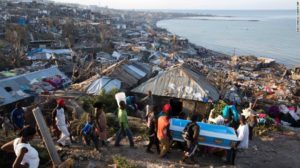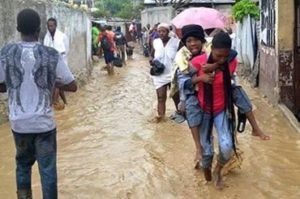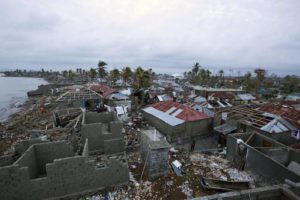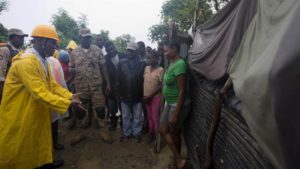As anyone who has been watching the news knows, Haiti is recovering from Hurricane Matthew, a Category 4 hurricane that recently devastated the poorest country in Latin America. Even as they try to pick up the pieces, find their loved ones, and rebuild their homes, another possible disaster is looming – a cholera outbreak.

Hurricane Matthew hit Haiti hard. It was the most devastating hurricane to hit this country in a decade, and kept up its devastation for seven days. It is estimated that thousands of homes were destroyed, and over 60,000 are now living in temporary shelters. As crops were also destroyed throughout much of the country, there are growing concerns about food resources. Mourad Wahba, the UN humanitarian co-ordinator working in Haiti says “we are not far from having one million people who are in urgent need of humanitarian assistance.”
The hospital in Port-a-Piment has already received several patients ill with cholera, and more patients are coming in every hour. In fact, there has been a cholera problem since the 2010 earthquake when the disease arrived on the island with the Nepalese UN troops. Aid workers already present in Haiti say they were not expecting this secondary health concern to show up so quickly and so severely. “A massive humanitarian response is needed to address this epidemic, and the response needed hasn’t happened yet.”

The United Nations has already launched a fund-raising campaign to raise $120 million for life-saving aid. According to Haiti’s Ministry of the Interior, 1.4 million people are urgently in need of assistance. There are concerns that the severity of the damage sustained to this small nation has not been fully conveyed in the news. Parts of the western regions are completely devastated. Some places where 90% of the infrastructure has been destroyed. Crops are almost completely destroyed. There is a lack of sufficient food or clean water, which has led some aid groups to start worrying about a possible long-term famine as well.

Volunteer groups and aid organizations have already started arriving in Haiti in an attempt to help. Some have donated money and resources, and some simply flew in so they could donate their time. But sadly, it has already become apparent that some of the volunteer initiatives are actually causing more problems than relief. Volunteering plays an important and critical role as a whole in our society. Without these volunteers, disasters could potentially destroy entire communities and devastate lives even further. But others feel that the growing popularity in volunteer programs can shift from helpful to detrimental. There is even a growing niche being called “disaster tourism”.

Volunteering, when well-designed, does help to rebuild lives and restore hope for those hardest hit by disaster. Which is why it is important to go through a professional and experienced organization so your time, dollars, and efforts are as effective and impactful as possible. Disturbingly, after the 2010 earthquake in Haiti, a report from NPR and ProPulica found that much of the $500 million that was donated to Red Cross is still unaccounted for. Charity Navigator and Guidestar are great websites to do some back-ground checking on those aid organizations you may be considering to make your donations. Their best advice:
- Choose organizations that limit operating expenses to less than 20% of their annual budget
- Be wary of organizations that have been set up right after a disaster – it is simply not possible to create the infrastructure needed to address the problems and disperse the funds appropriately
- Follow up with the organization you did choose in a few months to see where your money went.
Some of the ‘new’ charities that suddenly spring up after a disaster may actually be scams. The FBI found 4,000 scam websites that were set up after Hurricane Katrina.
Here is a list of aid organizations that have a proven track record on doing what they promise so you know your donations will make a difference for those struggling to recover in Haiti.
Hope for Haiti
http://hopeforhaiti.com/
Haitian Health Foundation
Money is needed now, and can be utilized faster than donations of water, food, and medicine which will take longer to get to Haiti. Money can be used right away. http://www.haitianhealthfoundation.org/
Save the Children
Children are not able to access basic necessities and medical care, and also face other risks that make them particularly vulnerable.
http://www.savethechildren.org/
The St. Boniface Haiti Foundation
Has a four-star rating on Charity Navigator
Operates a full-service hospital on the southern peninsula of Haiti.
http://time.com/money/4521894/hurricane-matthew-how-help-haiti-victims/
Doctors Without Borders
Their teams in Haiti are monitoring the impact of Hurricane Matthew and are ensuring that patient care in their facilities in Port-au-Prince is maintained
http://www.doctorswithoutborders.org/country-region/haiti
Direct Relief
One of Charity Navigator’s highest-scoring charities
Has vowed that every cent of every donation related to Hurricane Matthew will be used for relief efforts, not for fundraising.
www.directrelief.org/emergency/haiti
Food for the Poor
“The people of Haiti need help, and they needed it yesterday,'” said Robin Mahfood, Food For The Poor’s President/CEO.
http://www.foodforthepoor.org
